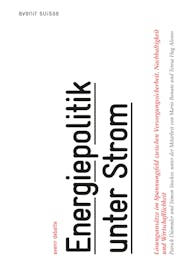When it comes to energy policy, Switzerland is facing a trilemma. Firstly, energy supply security must be increased. Secondly, the goal of achieving climate neutrality by 2050 requires a restructuring of the energy mix. And thirdly, both goals must be achieved at economically viable costs.
Falling gross energy consumption, growing electricity demand
As a first step, a new Avenir Suisse study by Patrick Dümmler and Simon Stocker analyses the status quo in Switzerland. While the gross energy consumption for all energy sources has decreased over the last ten years, demand for electricity is continuously increasing. By 2050, it is assumed that an additional demand of between 30% and50% will arise, depending on the scenario. Without an expansion of domestic electricity production, the energy transition will mean that Switzerland’s dependence on imports will increase, especially in winter.
With 41 cross-border power lines, from a technical perspective Switzerland is more closely integrated into Europe’s internal electricity market than any other country. Nevertheless, it is neither commercially nor legally an equal partner in this market. The fact that balancing measures have to be taken to mitigate unscheduled electricity flows and the threat of import restrictions in Switzerland leads to rising costs for consumers.
From an energy policy perspective, there is no way around closer cooperation between Switzerland and the European Union with regard to energy. As a bare minimum, technical agreements to stabilise the Swiss electricity grid must be put in place. However, these will not replace the medium-term need to conclude an electricity agreement that allows for mutual market access and maintains Switzerland’s import capacities. A prerequisite for full integration would be a comprehensive liberalisation of the Swiss electricity market. In the long term, a comprehensive energy agreement that covers hydrogen and synthetic energy sources in addition to electricity would make the most economic sense.
Cost transparency instead of subsidies
In conjunction with this, energy policy must contribute to achieving climate goals, for example by consistently pricing CO₂ emissions and turning away from inefficient, small-scale subsidy policies influenced by the deadweight effect. If, for political reasons, subsidies are nevertheless to continue to be provided instead of pursuing a climate policy that aims for cost transparency, the freedom to choose the technology to be used must be guaranteed.
New financing options, so-called financial Contracts for Differences (fCfD), are available to ensure security of supply. These contracts mean electricity producers receive an incentive to optimise the efficiency of their facilities and to use them when there is too little electricity available. Making water rates (payments to hydropower plant locations) more market-oriented and opening the market up to foreign investors will increase the attractiveness of investments. Favourable framework conditions for creating seasonal storage options are also required. Security of supply should be temporarily prioritised over other objectives such as landscape conservation if the infrastructure cannot cope (e.g. if imports exceed 5 TWh). Existing nuclear power plants should remain on the grid as long as they can be operated safely and economically – even if this is for more than 60 years.
Ensuring affordability
Finally, affordability must be guaranteed. The burden of an average household in terms of energy (not just electricity) expenditure used to be around 1.1% of average household income but is likely to have increased in recent months. Nevertheless, a general cap on energy costs is not an option; those in real need can be supported within the framework of existing social assistance.
Measures such as intelligent energy consumption management help curb prices by allowing electricity to be purchased when it is in abundance. Furthermore, this reduces additional investments in energy infrastructure. The opening of the electricity market for small consumers could make an important contribution in this context, as it leads to more competition and an acceleration in the introduction of new supply models. Calls for an industrial electricity price, on the other hand, are not altogether constructive. In terms of regulatory policy, it would be better to improve the tax and legal framework for companies instead of giving them a helping hand with selective, market-distorting subsidies.






